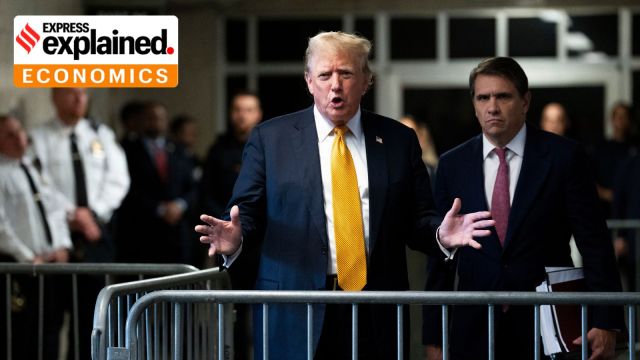US court holds IEEPA tariffs illegal: Understanding Trump’s use of emergency powers
Thus far, Trump has invoked the emergency authority to bypass Congress and impose tariffs immediately, without seeking public comments or information, and using the country’s trade deficit as a justification.
 Both courts objected to the administration’s use of its emergency powers under the 1977 International Emergency Economic Powers Act (IEEPA), which the President has invoked variously over the last six months to address the American trade deficit. (NYT)
Both courts objected to the administration’s use of its emergency powers under the 1977 International Emergency Economic Powers Act (IEEPA), which the President has invoked variously over the last six months to address the American trade deficit. (NYT)A US federal court on Friday (August 29) held that several of Trump’s tariff announcements were illegal, and that the US president did not possess the “wide-ranging authority to impose tariffs” under his several executive orders.
The 7-4 decision by the US Court of Appeals for the Federal Circuit upheld a decision taken in May by a Manhattan Trade Court. However, the implementation of this order has been delayed till October, allowing the Trump administration to appeal against the ruling in the Supreme Court.
Both courts objected to the administration’s use of its emergency powers under the 1977 International Emergency Economic Powers Act (IEEPA), which the President has invoked variously over the last six months to address the American trade deficit. Thus far, Trump has invoked the emergency authority to bypass Congress and impose tariffs immediately, without seeking public comments or information, and using the country’s trade deficit as a justification.
Here is what to know.
How American presidents invoked the IEEPA pre-Trump
The US has virtually been in a state of emergency for decades, ever since President Jimmy Carter enacted the IEEPA in 1977 to replace the outgoing Trading with the Enemy Act of 1917 (TWEA), which had given the US president sweeping powers. However, this bears no resemblance to the Indian experience of 1975, which curtailed the fundamental rights to freedom of speech and expression, and temporarily suspended the federal government structure of the state into a unitary government, with states directed to follow the central government’s diktat.
The IEEPA empowers the US President “to deal with any unusual and extraordinary threat, which has its source in whole or substantial part outside the United States, to the national security, foreign policy, or economy of the United States, if the President declares a national emergency with respect to such threat.”
So far, US presidents have used the act to impose sanctions on other nations: President Carter declared a national emergency in the wake of the 1979 Iran hostage crisis to freeze all Iranian government assets in the US. And President George W Bush did something similar in 2001 following the September 11 attacks on the World Trade Center and the Twin Towers.
A Congressional Research Service report noted that US presidents had invoked the IEEPA to declare 69 national emergencies, many of which lasted for over a decade.
How Trump’s emergency declarations broke away from this tradition
Since his return to office, Trump has repeatedly invoked the idea that the US is facing a “national emergency”. He declared a national emergency at the US’s southern border on his first day in office, and announced 25% tariffs against Mexico and Canada on February 1, in a bid to pressure the two nations to do more to curb illegal migration and fentanyl trafficking.
Similarly, the executive order announcing the sweeping “Liberation Day” tariff announcements on April 2 said that the US is facing a “national emergency” due to the “foreign trade and economic practices” and the “absence of reciprocity” in its trade relationships. Trump announced two tariff categories that day – a 10% baseline aimed at all countries, and country-specific “reciprocal” tariffs on countries with which the US maintained the largest trade deficits.
What the present rulings mean
Shortly after the tariff announcements, a cluster of American small businesses and Democrat-run states filed cases challenging the constitutionality of Trump’s tariff announcements and said they had been financially harmed by the taxes on foreign goods.
A three-judge panel of the US Court of International Trade in Manhattan on May 28 ruled that the IEEPA “does not authorize the President to impose unbounded tariffs”, and challenged the validity of the two sets of tariffs. It held that Trump exceeded his authority under the IEEPA in imposing tariffs, and that the “Worldwide and Retaliatory tariffs are thus ultra vires and contrary to law.”
The court also found the fentanyl tariffs invalid simply because of the president’s logic of using these to pressure the affected countries to curb drug trafficking. The bench held that the IEEPA may be invoked to directly deal with the so-called emergency, something that the fentanyl tariffs do not currently do.
The Friday appeals court ruling upholds these arguments.
Notably, the rulings by the trade court and the appeals court do not impact Trump’s sector-specific tariff announcements made outside the act. These include
- Tariffs on steel, aluminium, automobiles and copper under Section 232 of the 1962 Trade Expansion Act, which depend on a 2019 Commerce Department investigation ruling these imports a ‘national security’ risk. Potential tariffs on pharma products and semiconductor chips under Section 232, pending an investigation into these industries.
- Tariffs on solar energy under Section 201 of the 1974 Trade Act, dating back to Trump’s first term (2017-21). These are safeguard tariffs meant to protect domestic industries from foreign competition.
- The Section 301 tariffs on imports from China, punishing unfair trade practices.
- 01
- 02
- 03
- 04
- 05






































